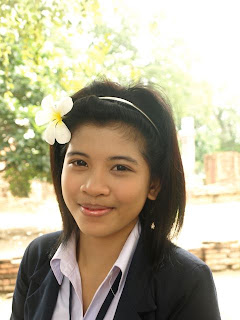I have been to Pattaya, Surin, Ang Thong, Suphan Buri, Korat, and Ayutthaya in the past three months. I like cruising into a small town, one which rarely sees a farang, and settling down, even if only for a few days. Wander around, take pics, waymark, create or update the wikipedia entry, hang out. Find what is interesting or unique in the place.
Ayutthaya was the most interesting spot. I visited here in 2007, but only for a day—a trip on the river there and back. Ayutthaya is an 'ancient' capital of Thailand. For around three centuries (1351-1767) it was the capital of a Siamese kingdom. The city region itself is a large island, created by narrow rivers. It is also in the centre of a rich agricultural region, and the rivers brought in river trade. Needless to say it was very rich. This wealth is displayed by the abundant, large, ruins still extant in the former city. The city came to an end in 1767 when a Burmese army finally managed to enter the city. They then carried away everything of value and destroyed the rest. It is now a tourist destination and a UNESCO world heritage site.
Right now, I am back in Surin. Tomorrow heading into Cambodia to Siem Reap. I will be spending a week in SR, then PP, then elsewhere for a month or so in Cambo.
Best of luck to all.
* Check out the link to the Cultofless. A website which discusses the ethics, modalities, and thinking behind living with less, relying on the digital lifestyle to thrive and survive. Digital Nomads.
Thailand and politics! The Red Shirt menace is nearly officially over. A few provinces are still under martial law, but most of the ring leaders are under arrest and threatened with expensive and protracted legal action. However, all of that ignores the fundamental situation. There is still a large body of folk in Thailand who believe they are getting the short end of the stick (I agree). They want change, justice, fairness. And they will not get it the way things are going. There will be new elections in Thailand next year. It will be interesting to see who wins. I suspect the Reds, under a different name, with Mr T., the former PM, playing a lesser role. I also suspect that Thailand will be in for some rough times ahead.
New feature: Hotel Reviews
I thought that I might just add reviews of the hotels in which I stay. A resource, and so forth.
In Ayutthaya I stayed at the 'Lima Place'. I came across this hotel on the internet. I liked it because it was a little out of town, and had good internet. I wanted a little p&q after Pattaya. Overall, good. ~500b a night depending on the type of room you want. A little basic, but entirely adequate. A restaurant onsite, a small shop in reception, good staff, adequate English.
The one drawback, it is ~3kms from Ayutthaya island, a bit of a walk during the hot day, and at night stray dogs. The hotel charges 100b (~$3) for a ride into the town, fair price. There is also a local bus which runs past the hotel, so it is not really a big problem, but I urge not to walk at night, stray dogs and rabies no fun.
http://www.limaplace.com/
In Korat I stayed at 'The Chaophaya Inn'. A mid range, right in the centre of Korat. 500b a night for a standard room. A tad basic, but it is all there. Coffee shop, massage, an excellent value buffet dinner for 69b. Price includes wireless. Way to go.
http://www.chaophayainn.com/
http://www.chaophayainn.com/










Comments